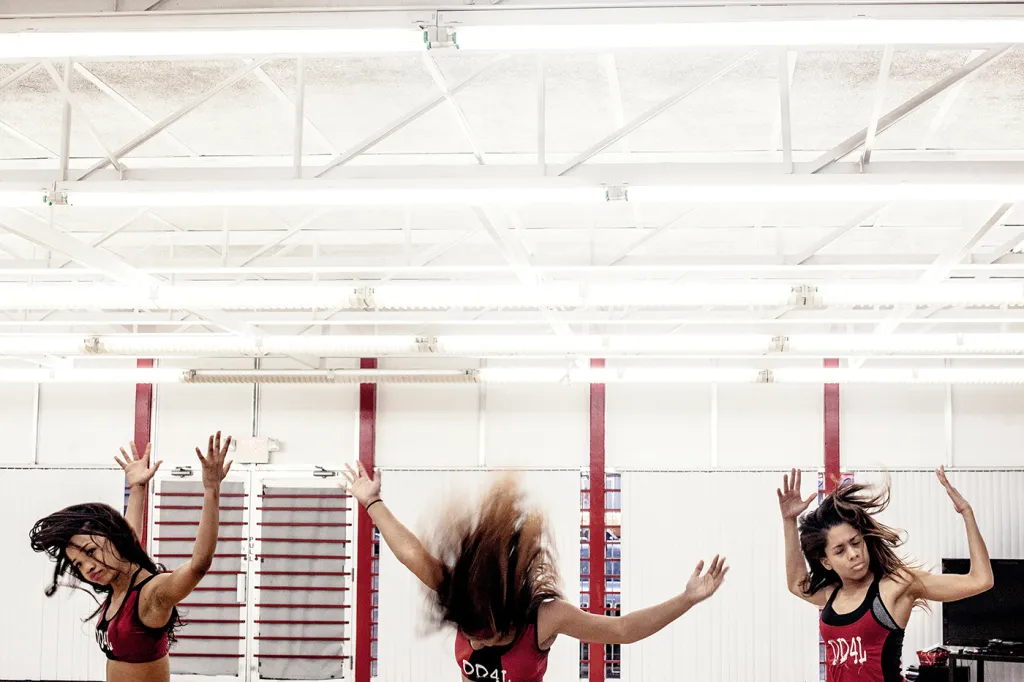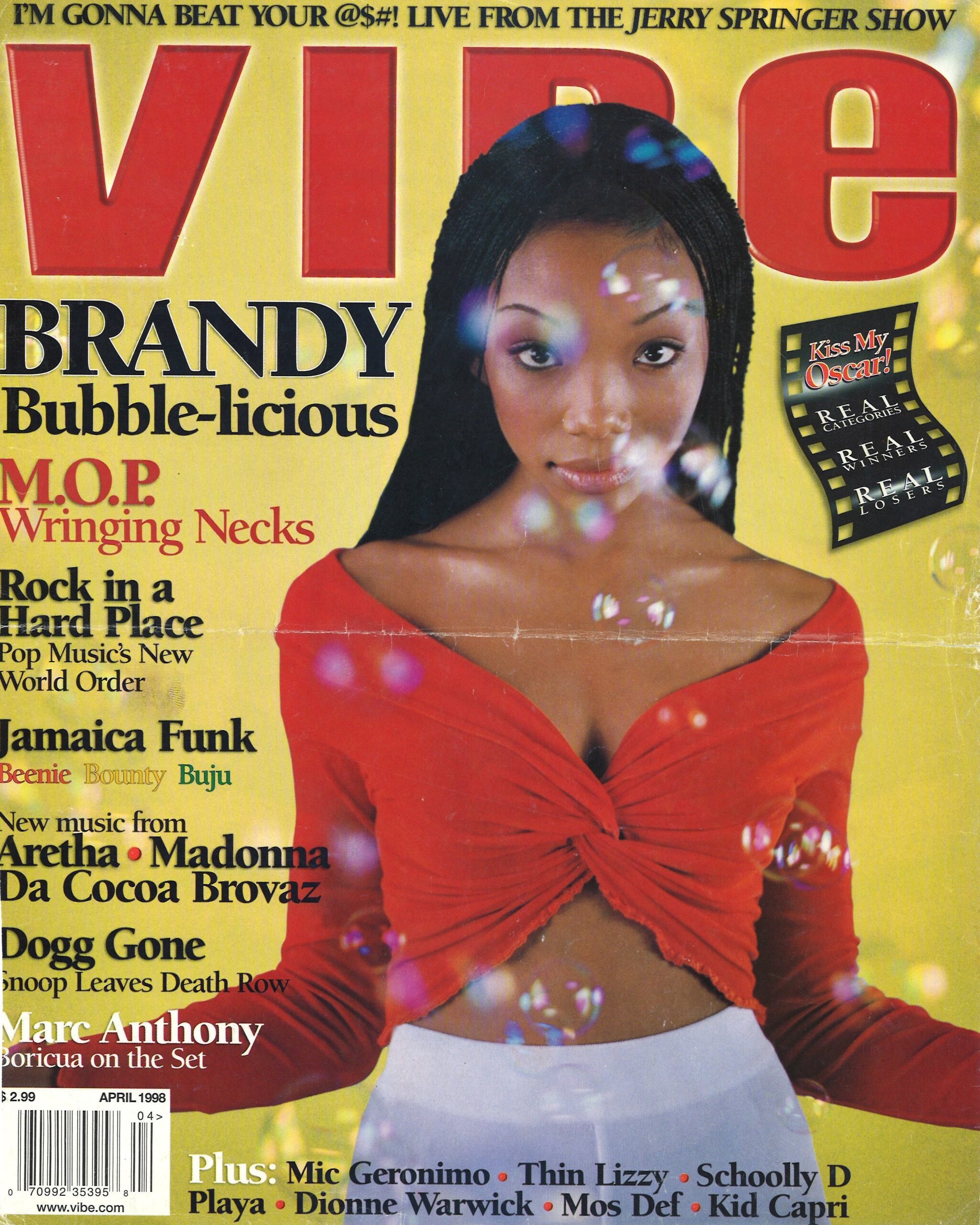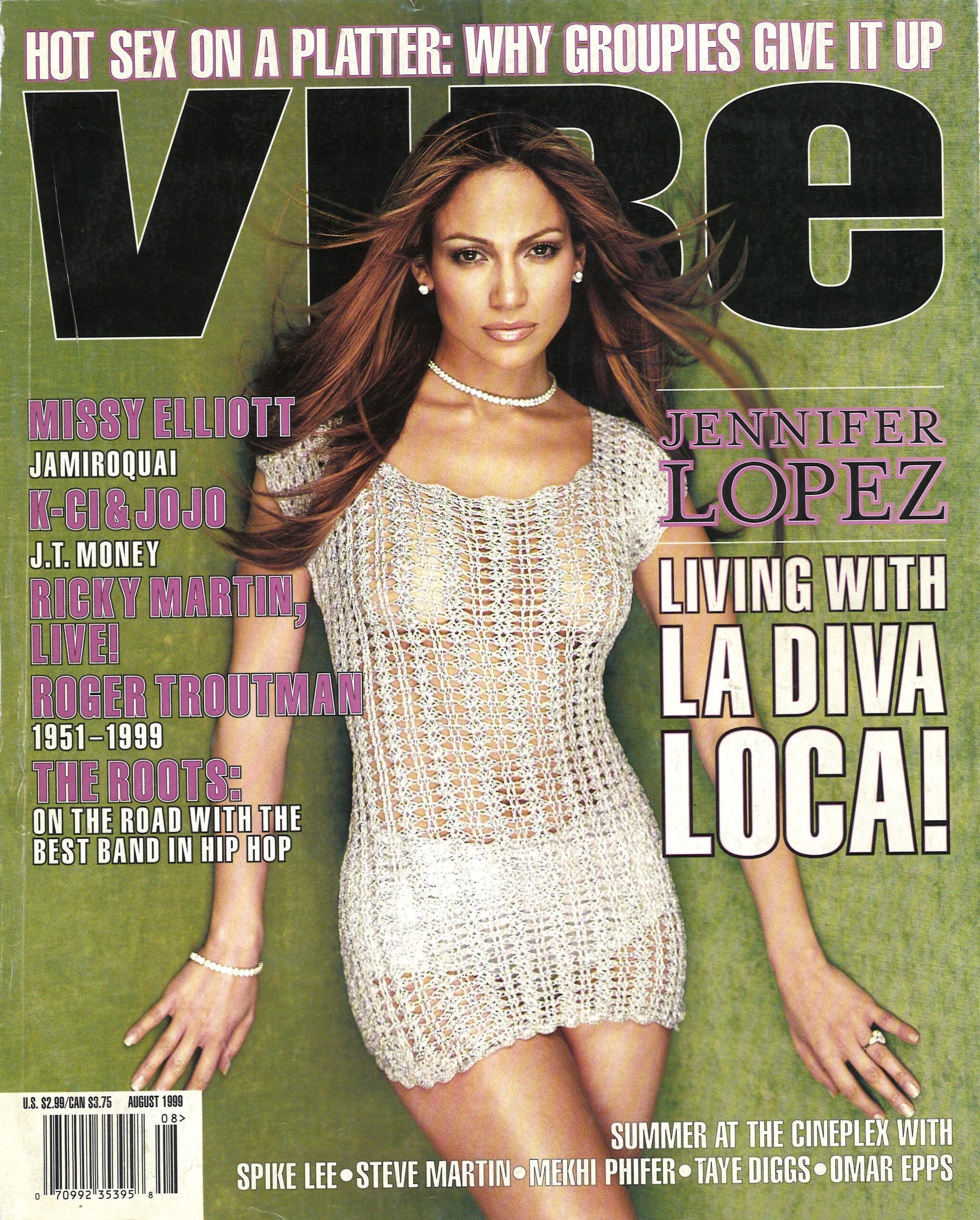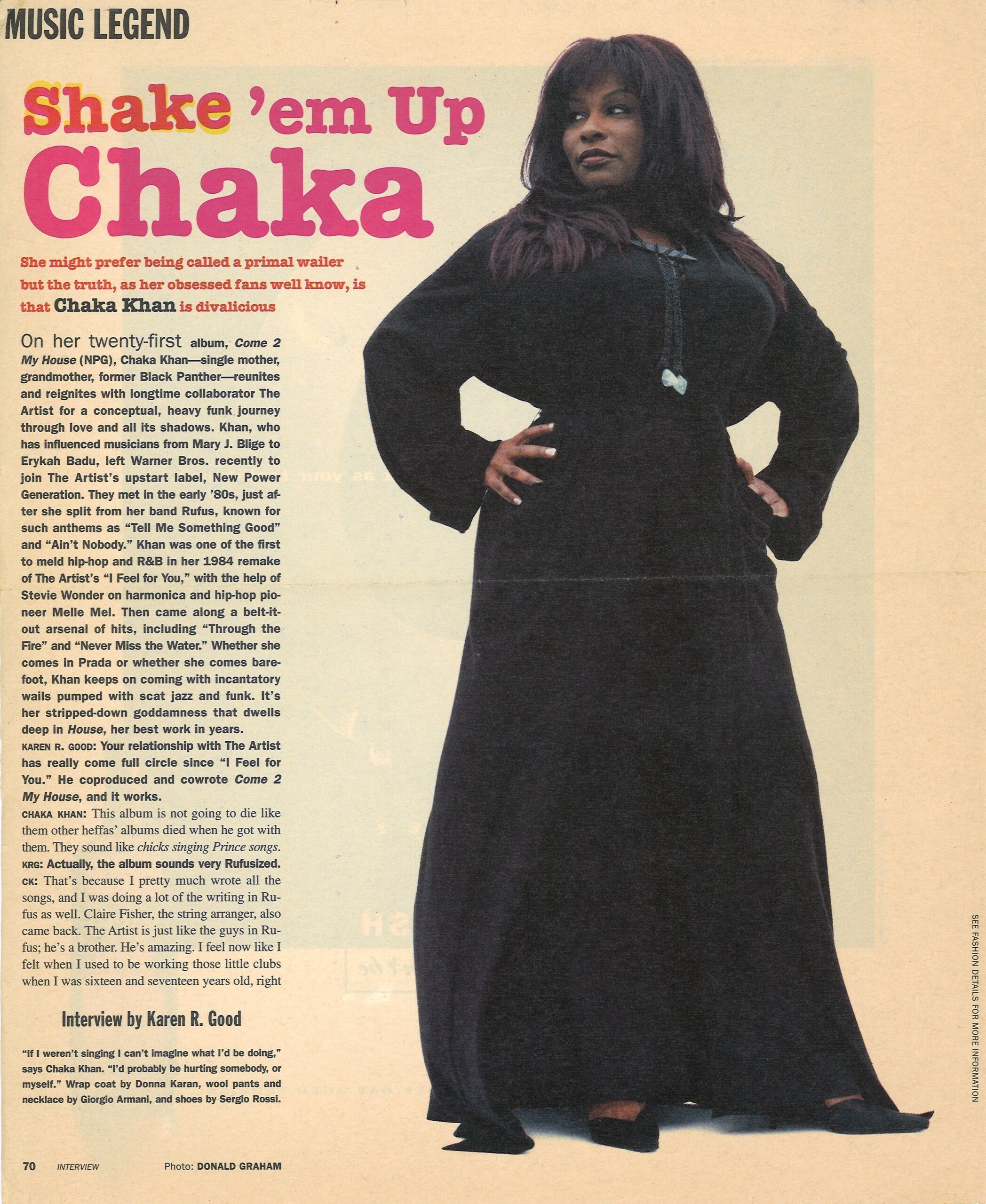
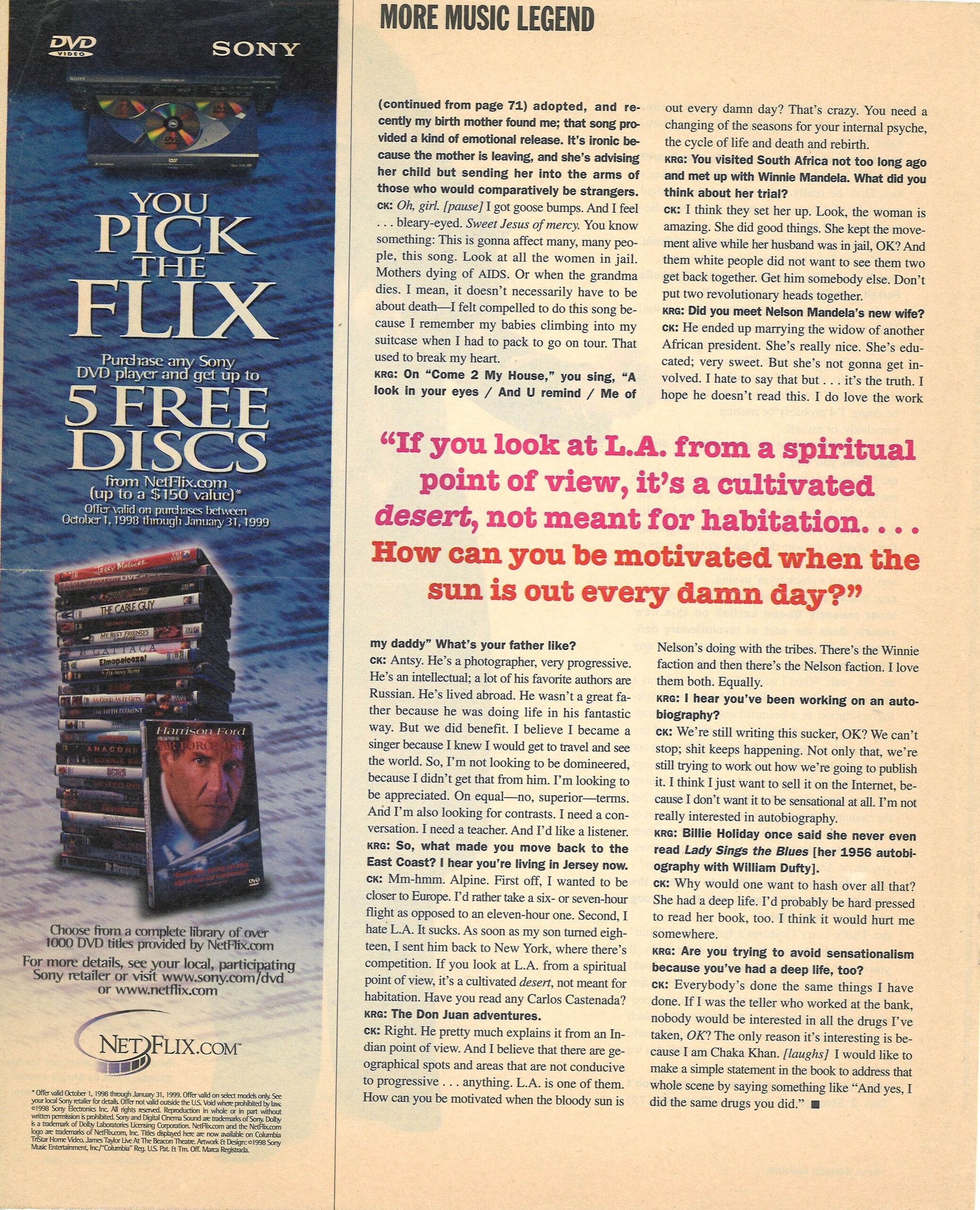
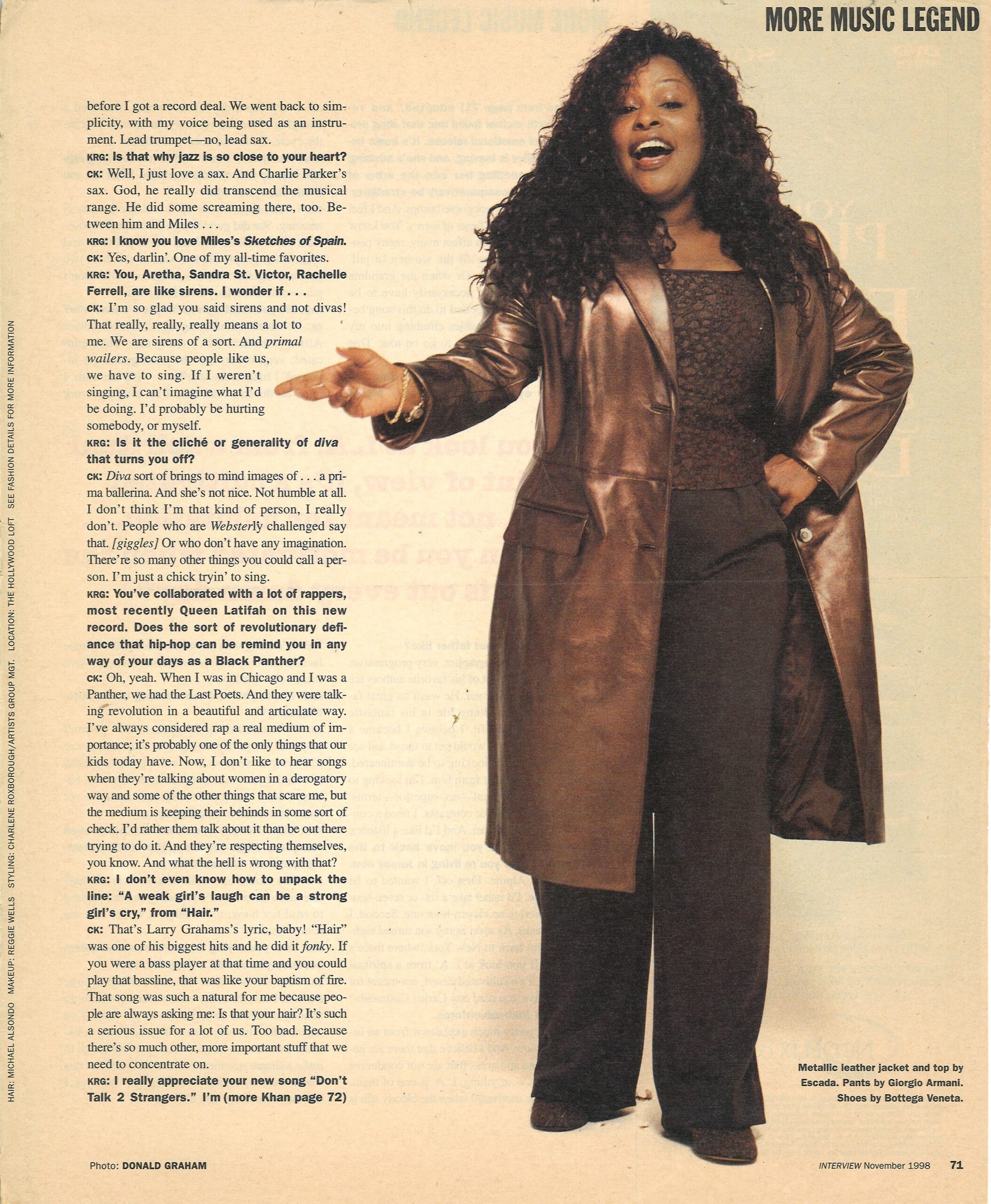
Shake ‘em Up Chaka
She might prefer being called a primal wailer but the truth, as her obsessed fans well know, is that Chaka Khan is divalicious.
By Karen R. Good
Interview magazine
On her twenty-first album, Come 2 My House (NPG), Chaka Khan—single mother, grandmother, former Black Panther—reunites and reignites with longtime collaborator The Artist for a conceptual, heavy funk journey through love ad all its shadows. Khan, who has influenced musicians from Mary J. Blige to Erykah Badu, left Warner Bros. recently to join The Artist’s upstart label, New Power Generation They met in the early ‘80s, just after she split from her band Rufus, known for such anthems as “Tell Me Something Good” and “Ain’t Nobody.” Khan was one of the first to meld hip-hop and R&B in her 1984 remake of The Artist’s “I feel for You,” with the help of Stevie Wonder on harmonica and hip-hop pioneer Melle Mel. Then came along a belt-it-out arsenal of hits, including “”Through the Fire” and “Never Miss the Water.” Whether she comes in Prada or whether she comes barefoot, Khan keeps on coming with incantatory walls pumped with scat jazz and funk. It’s her stripped-down goddamness that dwells deep in House, her best work in years.
Karen R. Good: Your relationship with The Artist has really come full circle since “I Feel for You.” He coproduced and cowrote Come 2 My House, and it works.
Chaka Khan: This album is not going to die like them other heffas’ albums died when he got with them. They sound like chicks singing Prince songs.
KRG: Actually, the album sounds very Rufusized.
CK: That’s because I pretty much wrote al the songs, and I was doing a lot of the writing in Rufus as well. Claire Fisher, the string arranger, also came back. The artist is just like the guys in Rufus; he’s a brother. He’s amazing. I feel now like I felt when I used to be working those little clubs when I was sixteen and seventeen years old, right before I got a record deal. We went back to simplicility, with my voice being used as an instrument. Lead trumpet—no, lead sax.
KRG: Is that why jazz is so close to your heart?
CK: Well, I just love a sax. And Charlie Parker’s sax. God, he really did transcend the musical range. He did some screaming there, too. Between him and Miles…
KRG: I know you love Mile’s Sketches of Spain.
CK: Yes, darlin’. One of my all-time favorites.
KRG: You, Aretha, Sandra St. Victor, Rachelle Ferrell, are like sirens. I wonder if…
CK: I’m so glad you said sirens and not divas! That really, really, really means a lot to me. We are sirens of a sort. And primal wailers. Because people like us, we have to sing. If I weren’t singing, I can’t imagine what I’d be doing. I’d probably be hurting somebody, or myself.
KRG: Is it the cliché or generality of diva that turns you off?
CK: Diva sort of brings to mind images of… a prima ballerina. And she’s not nice. Not humble at all. I don’t think I’m that kind of person. I really don’t. People who are Websterly challenged say that. [giggles] Or who don’t have any imagination. There’re so many other things you could call a person. I’m just a chick tryin’ to sing.
KRG: You’ve collaborated with a lot of rappers, most recently Queen Latifah on this new record. Does the sort of revolutary defiance that hip-hop can be remind you in any way of your days as a Black Panther?
CK: Oh, yeah. When I was in Chicago and I was a Panther, we had the Last Poets. And they were talking revolution in a beautiful and articulate way. I’ve always considered rap a real medium of importance; it’s probably one of the only things that our kids today have. Now, I don’t like to hear songs when they’re talking about women in a derogatory way and some of the other things that scare me, but the medium is keeping their behinds in some sort of check. I’d rather them talk about it than be out there trying to do it. And they’re respecting themselves, you know. And what the hell is wrong with that?
KRG: I don’t even know how to unpack the line: “A weak girl’s laugh can be a strong girl’s cry,” from “Hair.”
CK: That’s Larry Graham’s lyric, baby! “Hair” was one of his biggest hits and he did it fonky. If you were a bass player at that time and you could play that bassline, that was like your baptism of fire. That song was such a natural for me because people are always asking me: Is that your hair. It’s such a serious issue for a lot of us. Too bad. Because there’s so much other, more important stuff that we need to concentrate on.
KRG: I really appreciate your new song, “Don’t Talk 2 Strangers.” I’m adopted and recently my birth mother found me; that song provided a kind of emotional release. It’s ironic because the mother is leaving, and she’s advising her child but sending her into the arms of those who would comparatively be strangers.
CK: Oh girl. [pause] I got goose bumps. And I feel… bleary eyed. Sweet Jesus of mercy. You know something: This is gonna affect many, many people, this song. Look at all the women in jail. Mothers dying of AIDS. Or when the grandma dies. I mean, it doesn’t necessarily have to be about death—I felt compelled to do this song because I remember my babies climbing into my suitcase when I had to pack to go on tour. That used to break my heart.
KRG: On “Come 2 My House,” you sing, “A look in your eyes / And U remind /Me of my daddy.” What’ s your father like?
CK: Antsy. He’s a photographer, very progressive. He’s an intellectual; a lot of his favorite authors are Russian. He’s lived abroad. He wasn’t a great father because he was doing life in his fantastic way. But we did benefit. I believe I became a singer because I knew I would get to travel and see the world. So I’m not looking ot be domineered, because I didn’t get that from him. I’m looking to be appreciated. On equal—no, superior—terms. And I’m also looking for contrasts. I need a conversation. I need a teacher. And I’d like a listener.
KRG: So what made you move back to the East Coast. I hear you’re living in Jersey now.
CK: Mm-hmm. Alpine. First off, I wanted to be closer to Europe. I’d rather take a six- or seven-hour flight as opposed to an eleven-hour one. Second, I hate L.A. It sucks. As soon as my son turned eighteen, I sent him back to New York, hwere there’s competition. If you look at L.A., from a spiritual point of view, it’s a cultivated desert, not meant for habitation. Have you read any Carlos Castenada?
KRG: the Don Juan adventures.
CK: Right. He pretty much explains it from an Indian point of view. And I believe that there are geographical spots and areas that are not conducive to progressive… anything. L.A. is one of them. How can you be motivated when the bloody son is out every damn day? That’s crazy You need a changing of the seasons for your interal psyche, the cycle of life and death and rebirth.
KRG: You visited South Africa not too long ao and met up with Winnie Mandela. What did you think about her trial?
CK: I think they set her up. Look, the woman is amazing. She did good things. She kept the movement alive while her husband was in jail, OK? And them white people did not want to see them two get back together. Get him somebody else. Don’t put those revolutionary heads together.
KRG: Did you meet Nelson Mandela’s new wife [Graça Machel]?
CK: He ended up marrying the widow of another African president. She’s really nice. She’s educated; very sweet. But she’s not gonna get involved. I hate to say that but… it’s the truth. I hope he doesn’t read this. I do love the work Nelson’s doing with the tribes. There’s the Winnie fation and then there’s the Nelson faction. I love them both. Equally.
KRG: I hear you’ve been working on an autobiography?
CK: We’re still writing this sucker, OK? We can’t stop; shit keeps happening. Not only that, we’re still trying to work out how we’re going to publish it. I think I just want to sell it on the Internet, because I don’t want it to be sensational at all. I’m not really interested in autobiography.
KRG: Billie Holiday once said she never even read Lady Sings the Blues [her 1956 autobiography with William Dufty].
CK: Why would one want to has over all that? She had a deep life. I’d probably be hard pressed to read her book, too. I think it would hurt me somewhere.
KRG: Are you tring to avoid sensationalism because you’ve had a deep life, too?
CK: Everybody’s done the same things I have done. If I was the teller who worked at the bank, nobody would be interested in all the drugs I’ve taken, OK? The only reason it’s interesting is because I am Chaka Khan. [laughs] I would like to make a simple statement in the book to address that whole scene by saying something like, “And yes. I did the same drugs you did.”


